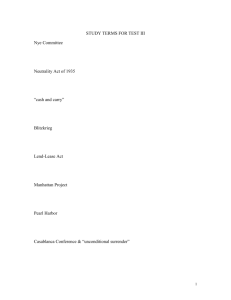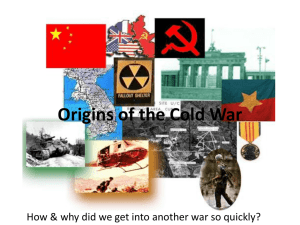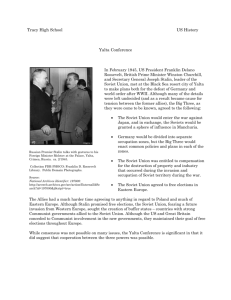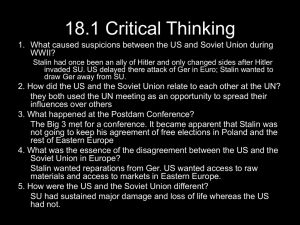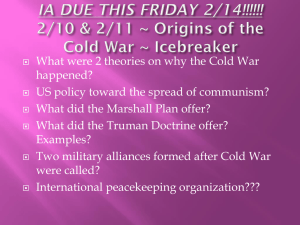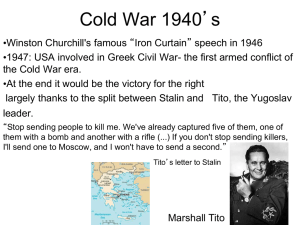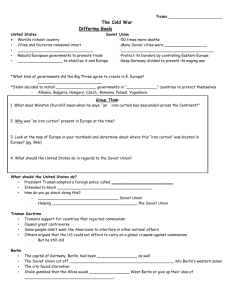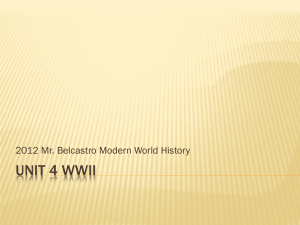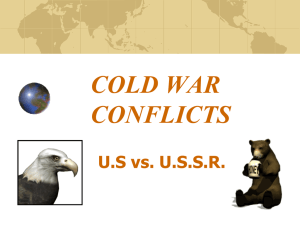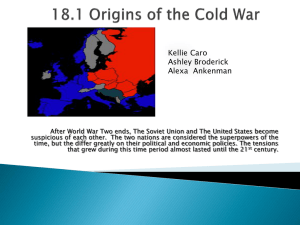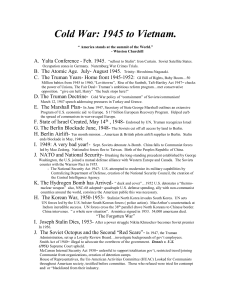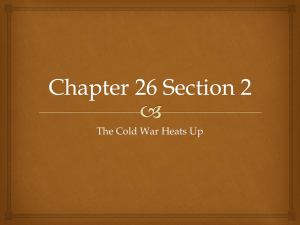18_1 Origins of the Cold War
advertisement
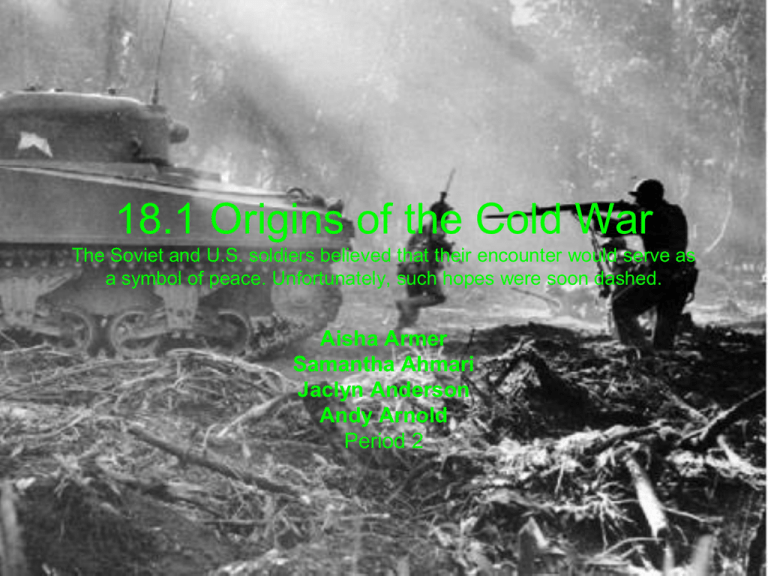
18.1 Origins of the Cold War The Soviet and U.S. soldiers believed that their encounter would serve as a symbol of peace. Unfortunately, such hopes were soon dashed. Aisha Armer Samantha Ahmari Jaclyn Anderson Andy Arnold Period 2 Vocabulary Terms • United Nations (UN): The representatives of 50 nations met in San Francisco to establish this new peacemaking body. The delegates signed a charter establishing the UN. • Satellite Nations: Countries dominated by the Soviet Union. • Containment: Taking measures to prevent any extension of communist rule to other countries. • Cold War: A conflict between the United States and the Soviet Union in which neither nation directly confronted the other on the battlefield. • Truman Doctrine: He declared the “It must be a policy of the United States to support free peoples who are resisting attempted subjugation by armed minorities or by outside pressures” Vocabulary Terms Continued • Marshall Plan: The program proposed by secretary of state George Marshall in 1947, under which the united states supplied economic aid to European nations to help them rebuild after World War II. • Berlin Airlift: To fly food and supplies into West Berlin. • North Atlantic Treaty Organization (NATO): A defensive military alliance formed in 1949 by ten western European countries, the U.S. and Canada. Former Allies Clash • • • • Since the Soviet Union had once been allies with Hitler, the Americans and Soviets became more suspicious of each other. Relations worsened once Stalin learned the US tried to keep the development of the atomic bomb secret. The UN was intended to promote peace after the war but it became an arena for superpowers to spread they’re influence over others. Stalin, Truman and Attlee-who replaced Churchill- met in Potsdam – Stalin went against what he promised Roosevelt and prevented free elections in Poland and banned democratic parties. Tension Mounts • • • • • US industry boomed during the war At Potsdam it was decided that Soviets, British, Americans, and French would take reparations from their own occupation zones Soviets wanted to take reparations from Germany to repay wartime losses Soviet union had economic and military strength after war Stalin gave a speech announcing communism and capitalism were incompatible - and another war was inevitable. • • Americans were gonna stop “babying the Soviets” George F. Kennan, an American diplomat in Moscow, proposed to prevent any extension of communism to other countries. Cold War in Europe • • • • The cold war (conflict between the US and the Soviet Union) dominated global affairs from 1945 until 1991 Britain tried to give the US aid in Europe but they were too destroyed by the war and couldn’t afford to help Truman asked for $400 million in economic and military aid for Greece and Turkey to keep Soviet influence from spreading- known as Truman Doctrine June 1947, George Marshall proposed for the US to aid all European nations that needed it to cure hunger, poverty, desperation, and chaos – Over the next 4 years 16 countries received $13 billion in aid – The communist part had lost appeal to voters Superpowers Struggle Over Germany • • The US, Britain, and France wanted to combine their 3 zones of Germany – Since Stalin didn’t give access to Berlin to Allies and he closed all highways and rail routes so no food or fuel could be transferred in Berlin airlift- Britain and American officials landed in Berlin for 327 every few minute – 227,000 flights, brought in 2.3 million tons of supplies – May 1949, Soviet Union realized they were beat and lifted the blockade 10 Western European Nations joined the US and Canada to form defensive military alliance called North Atlantic Treaty Organization(NATO) Questions 1. What caused suspicion between the untied states and the soviet union during World War 2? 2.What happened at the Potsdam Conference? 3. What was the Truman Doctrine? 4. What was the Marshall Plan? 5. What caused Stalin to close access to Berlin? Answers 1. 2. 3. 4. 5. The United states and the soviet union had very different ambitions for the future. These differences a climate of icy tension that plunged the two countries into a bitter rivalry. The Soviet Union, England and the united states decided what should happen to east and west Germany The policy of the United States to support free people who are resisting attempted subjugation by armed minorities or by outside pressures. 16 countries received some $13 billion in aid Stalin took over east Germany and cut it off from west Germany Links • http://news.bbc.co.uk/media/images/38805000/jpg /_38805725_natoflags_emblem.jpg • http://www.johndclare.net/images/Marshallbike.JP G • http://estonia.usembassy.gov/georgekennan.jpg • http://www.kilroywashere.org/06Images/Invasion/SessionPotsdam-Arc.jpg • http://www.allamericanpatriots.com/files/trumandoctrine.jpg
